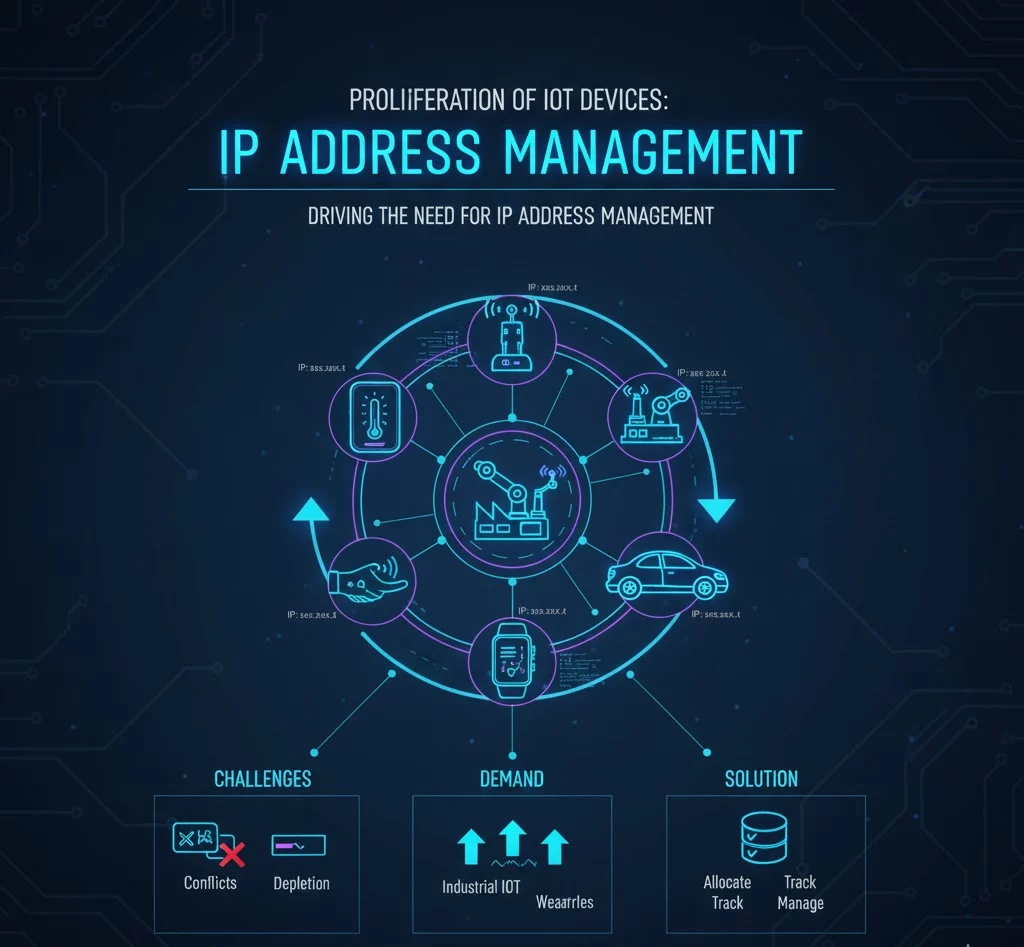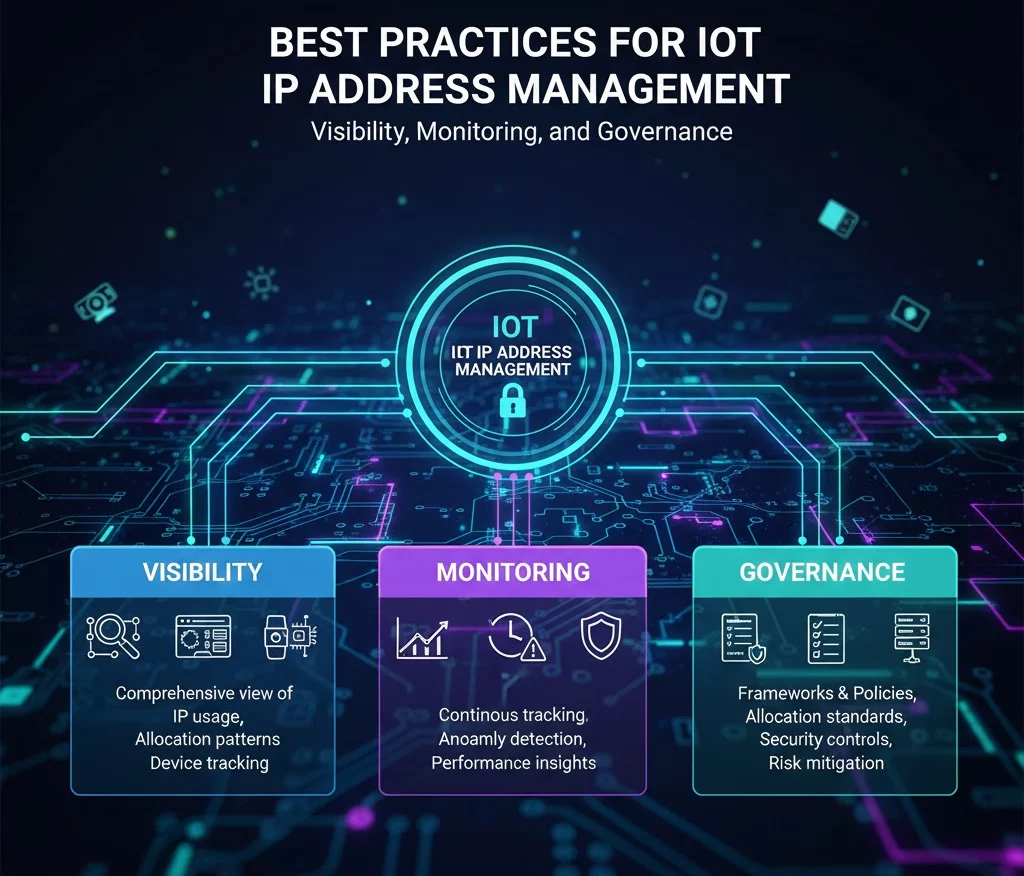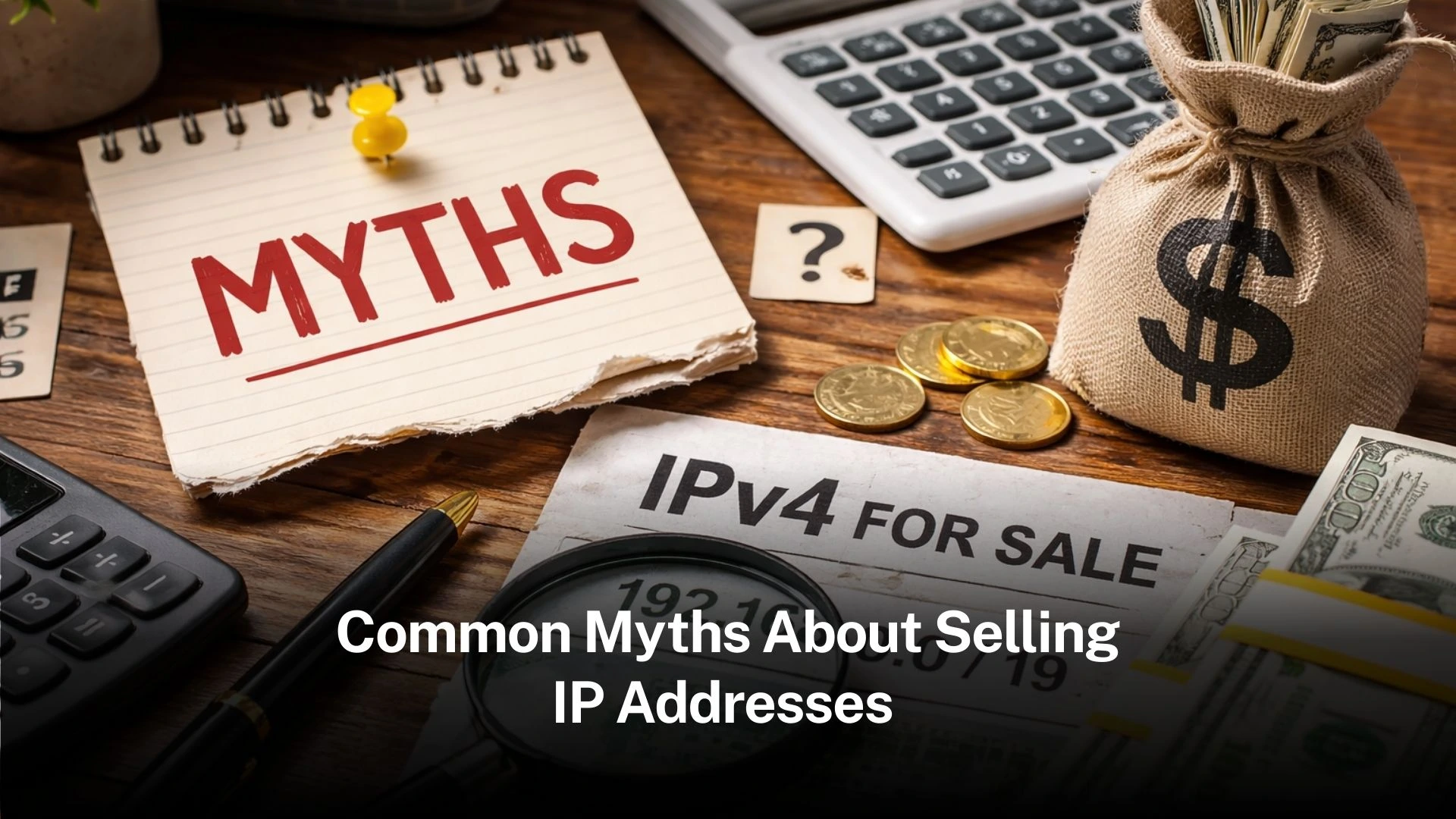IoT (Internet of Things) and IP Address Management

When we talk about the Internet of Things, abbreviated IoT, in digital transformation, the Internet of Things (IoT) has emerged as a transformative force, connecting billions of devices and enabling innovative applications across industries. At the heart of this interconnected ecosystem lies IP address management, a critical aspect that ensures the seamless communication and operation of IoT devices.
Table of Contents
Let’s delve into the symbiotic relationship between IoT and IP address management, exploring the challenges, strategies, and best practices for effectively managing IP addresses in the IoT landscape.
Proliferation of IoT Devices: Driving the Need for IP Address Management

As the number of IoT devices continues to skyrocket, ranging from smart thermostats and wearable devices to industrial sensors and autonomous vehicles, the demand for IP address management has never been greater. Each IoT device requires a unique IP address to communicate and interact with other devices and services over the Internet, necessitating robust IP address management practices to allocate, track, and manage these addresses efficiently. Without effective IP address management, organizations risk facing IP address conflicts, depletion of address space, and network performance issues, hindering the scalability and reliability of their IoT deployments.
Challenges in IoT IP Address Management: Scale, Security, and Scalability
Managing IP addresses in the IoT landscape poses several unique challenges stemming from the sheer scale and heterogeneity of IoT deployments, as well as the security and scalability requirements inherent to IoT applications. With millions, or even billions, of IoT devices interconnected across diverse networks and environments, traditional IP address management approaches may prove inadequate for addressing the dynamic nature of IoT deployments.
Additionally, security concerns, such as unauthorized access, data breaches, and device compromise, underscore the importance of implementing robust authentication, encryption, and access control mechanisms within IoT networks.
Strategies for Effective IoT IP Address Management: Automation and Orchestration
To overcome the challenges of IoT IP address management, organizations are increasingly turning to automation and orchestration solutions that streamline address allocation, provisioning, and lifecycle management processes.
By leveraging automation tools and centralized management platforms, organizations can dynamically assign and reclaim IP addresses based on device provisioning, activation, and decommissioning events, ensuring optimal resource utilization and minimizing manual intervention.
Moreover, orchestration frameworks enable organizations to enforce policy-based IP address assignments, implement role-based access controls, and integrate with existing network infrastructure, thus enhancing security and scalability in IoT deployments.
Best Practices for IoT IP Address Management: Visibility, Monitoring, and Governance

In addition to automation and orchestration, adopting best practices for IoT IP address management is essential to ensuring the long-term success and sustainability of IoT deployments. This includes maintaining comprehensive visibility into IP address usage and allocation patterns across IoT devices, networks, and environments.
Furthermore, implementing governance frameworks and policies that define IP address allocation policies, address space management procedures, and security controls can help organizations maintain compliance, enforce standards, and mitigate the risks associated with IP address management in the IoT landscape.
Embracing the Future of IoT with Effective IP Address Management
In conclusion, the convergence of IoT and IP address management heralds a new era of innovation, connectivity, and efficiency in the digital landscape. By addressing the challenges, leveraging automation and orchestration solutions, and adopting best practices, organizations can unlock the full potential of IoT deployments while ensuring the scalability, security, and reliability of their IP address management infrastructure. As IoT continues to reshape industries and redefine connectivity, effective IP address management remains a cornerstone of success in the interconnected world of tomorrow.
Trusted IPv4 Leasing for Business Growth
Get enterprise-grade IPv4 space quickly, with seamless deployment and end-to-end management.
Get Started with i.leaseFAQs
Do IoT devices need Public or Private IP addresses?
Most IoT devices (like smart bulbs or sensors) use Private IP addresses (e.g., 192.168.x.x) to communicate within a local network, connecting to the internet via a gateway. However, industrial IoT devices that require direct remote access often need Public, Static IP addresses to ensure they can be reached reliably from anywhere.
Why is IPv6 critical for IoT growth?
IPv4 has run out of addresses (only ~4.3 billion exist), which is insufficient for the billions of new IoT devices coming online. IPv6 offers a virtually infinite address space (340 undecillion addresses), allowing every single IoT sensor to have its own unique, globally routable IP address without needing complex NAT workarounds.
What is an IP conflict in an IoT network?
An IP conflict occurs when two devices on the same network try to use the same IP address, causing both to disconnect. In IoT networks with thousands of devices, this is a common issue if IP management is done manually. Using an automated IPAM (IP Address Management) tool prevents this by tracking which IPs are in use in real-time.
Related Posts

Inbound vs. Outbound IPv4 Leasing: A Complete Guide for Enterprises
Understanding IPv4 leasing helps enterprises manage scarce address space, reducing risk and unlocking strategic growth opportunities in today’s digital economy. Key points Distinguishes between inbound (leasing in) and outbound (leasing out) IPv4 approaches and their strategic implications. Highlights contract structures, registry risk management and continuity considerations affecting global number resources. Inbound vs. outbound IPv4 leasing: complete enterprise guide In the post-exhaustion era of Internet Protocol version 4 (IPv4),Read more Related Posts Inbound vs. Outbound IPv4 Leasing: A Complete Guide for Enterprises Understanding IPv4 leasing helps enterprises manage scarce address space, reducing risk and unlocking strategic growth opportunities in today’s digital economy. Key Read more Common Myths About Selling IP Addresses The IPv4 secondary market is often shrouded in mystery, leading many organizations to sit on valuable digital assets because they Read more How to turn idle IPv4 addresses into a recurring revenue stream with iLease Unlock the hidden value of unused IPv4 addresses with iLease, turning dormant digital infrastructure into a recurring revenue stream while Read more .related-post {} .related-post .post-list { text-align: left; } .related-post .post-list .item { margin: 5px; padding: 10px; } .related-post .headline { font-size: 18px !important; color: #999999 !important; } .related-post .post-list .item .post_thumb { max-height: 220px; margin: 10px 0px; padding: 0px; display: block; } .related-post .post-list .item .post_title { font-size: 16px; color: #3f3f3f; margin: 10px 0px; padding: 0px; display: block; text-decoration: none; } .related-post .post-list .item .post_excerpt { font-size: 13px; color: #3f3f3f; margin: 10px 0px; padding: 0px; display: block; text-decoration: none; } @media only screen and (min-width: 1024px) { .related-post .post-list .item { width: 30%; } } @media only screen and (min-width: 768px) and (max-width: 1023px) { .related-post .post-list .item { width: 90%; } } @media only screen and (min-width: 0px) and (max-width: 767px) { .related-post .post-list .item { width: 90%; } }

Common Myths About Selling IP Addresses
The IPv4 secondary market is often shrouded in mystery, leading many organizations to sit on valuable digital assets because they fear the perceived complexity or legal “gray areas.” As IPv4 exhaustion becomes a permanent reality, the value of these addresses has skyrocketed, yet misconceptions continue to stall potential transactions. At i.lease, powered by the real-world expertise of LARUS, we’ve seen how these myths prevent companies from unlocking significant capital.Read more Related Posts Inbound vs. Outbound IPv4 Leasing: A Complete Guide for Enterprises Understanding IPv4 leasing helps enterprises manage scarce address space, reducing risk and unlocking strategic growth opportunities in today’s digital economy. Key Read more Common Myths About Selling IP Addresses The IPv4 secondary market is often shrouded in mystery, leading many organizations to sit on valuable digital assets because they Read more How to turn idle IPv4 addresses into a recurring revenue stream with iLease Unlock the hidden value of unused IPv4 addresses with iLease, turning dormant digital infrastructure into a recurring revenue stream while Read more .related-post {} .related-post .post-list { text-align: left; } .related-post .post-list .item { margin: 5px; padding: 10px; } .related-post .headline { font-size: 18px !important; color: #999999 !important; } .related-post .post-list .item .post_thumb { max-height: 220px; margin: 10px 0px; padding: 0px; display: block; } .related-post .post-list .item .post_title { font-size: 16px; color: #3f3f3f; margin: 10px 0px; padding: 0px; display: block; text-decoration: none; } .related-post .post-list .item .post_excerpt { font-size: 13px; color: #3f3f3f; margin: 10px 0px; padding: 0px; display: block; text-decoration: none; } @media only screen and (min-width: 1024px) { .related-post .post-list .item { width: 30%; } } @media only screen and (min-width: 768px) and (max-width: 1023px) { .related-post .post-list .item { width: 90%; } } @media only screen and (min-width: 0px) and (max-width: 767px) { .related-post .post-list .item { width: 90%; } }

How to buy IPv4 addresses through a certified IP broker
Buying IPv4 space requires policy compliance, verified need, and registry approval, making certified IP brokers essential guides through complex global transfers. IPv4 transactions are regulated transfers, not simple purchases — registries must approve documentation, justification and registration changes. Certified brokers reduce risk and delay by aligning buyers with registry policy, routing legitimacy and cross-region requirements. Why companies still need to buy IPv4 addresses The global supply of IPv4 addressesRead more Related Posts Inbound vs. Outbound IPv4 Leasing: A Complete Guide for Enterprises Understanding IPv4 leasing helps enterprises manage scarce address space, reducing risk and unlocking strategic growth opportunities in today’s digital economy. Key Read more Common Myths About Selling IP Addresses The IPv4 secondary market is often shrouded in mystery, leading many organizations to sit on valuable digital assets because they Read more How to turn idle IPv4 addresses into a recurring revenue stream with iLease Unlock the hidden value of unused IPv4 addresses with iLease, turning dormant digital infrastructure into a recurring revenue stream while Read more .related-post {} .related-post .post-list { text-align: left; } .related-post .post-list .item { margin: 5px; padding: 10px; } .related-post .headline { font-size: 18px !important; color: #999999 !important; } .related-post .post-list .item .post_thumb { max-height: 220px; margin: 10px 0px; padding: 0px; display: block; } .related-post .post-list .item .post_title { font-size: 16px; color: #3f3f3f; margin: 10px 0px; padding: 0px; display: block; text-decoration: none; } .related-post .post-list .item .post_excerpt { font-size: 13px; color: #3f3f3f; margin: 10px 0px; padding: 0px; display: block; text-decoration: none; } @media only screen and (min-width: 1024px) { .related-post .post-list .item { width: 30%; } } @media only screen and (min-width: 768px) and (max-width: 1023px) { .related-post .post-list .item { width: 90%; } } @media only screen and (min-width: 0px) and (max-width: 767px) { .related-post .post-list .item { width: 90%; } }